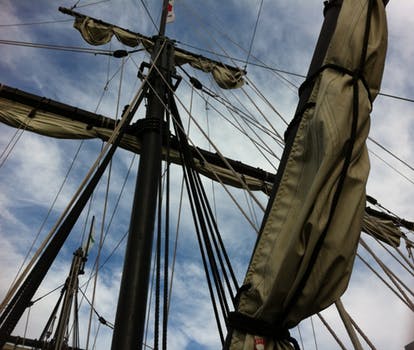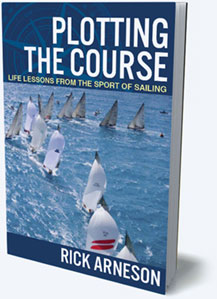
Have you ever wondered about the origin of some common expression or figure of speech that you find yourself using in everyday conversation? Some words and phrases have managed to work themselves into our language over time and become a part of the modern day lexicon, even though we often don’t know where they came from. Plenty of those expressions that we throw around today have nautical origins, even though their usage has spread far from the water’s edge. So just for fun, here are five common expressions that you might hear on land for which we have sailors to thank.
“Taken aback”
This term, now often used when we are stunned by something we’ve seen or heard, refers to sails inverting when a windshift or change of course causes them to fill on their opposite side and act as a brake. In essence, a person who is taken aback by something is, like a boat, stopped in their tracks.
“Three sheets to the wind”
Sheets are the proper sailing term for the rope that secures a sail. On square-riggers, each corner of a sail was secured by separate sheets, and if they came loose, the sail would flap in the breeze. A sail with three sheets loose in the wind would be flailing out of control, much like a drunk person to whom this term would be commonly applied today.
“The bitter end”
The bitter end refers to the end of a line on a boat; when you’ve run out of rope, you’ve reached the bitter end. The term as we often hear it on land typically refers to the end of a long effort, whether or not parties involved happen to feel bitter about it.
“High and dry”
When we refer to a person being left high and dry, we mean they are out of options and have nowhere to go. This refers to a boat that is beached, perhaps after the tide has run out after being anchored too close to shore, or washing up from a storm.
“Loose cannon”
Usually referring to a person who is out of control and causing harm in some fashion, this term comes from the havoc that could ensue if the rope securing a cannon on a warship came loose or broke, causing the heavy cannon to roll loose on deck when recoiling from firing.
It’s a safe bet that we’re all using nautical terms now and then without even realizing it, sometimes quite frequently. You could even use all of the above expressions together and come up with a sentence like: “Even though that loose cannon Frank was three sheets to the wind at the office party, I was taken aback to hear that the board chose to stand by him to the bitter end, rather than fire him and leave him high and dry.” Although sailing has a language all its own, it has still managed to make its own contribution to the English language for sailors and landlubbers alike.
Rick Arneson, M.B.A., is the author of Plotting the Course and is a lifelong sailor.












